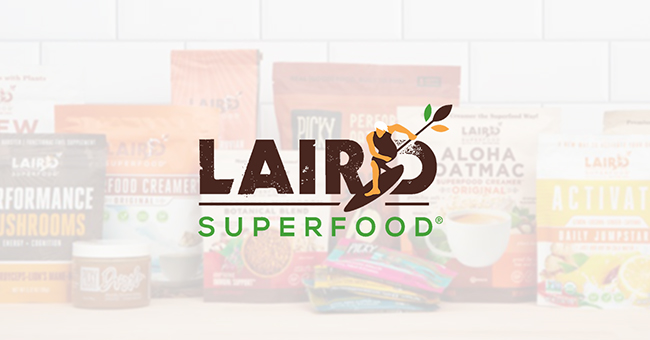Laird Superfood is shutting down its Sisters, Oregon production and fulfillment facility and laying off all workers at the end of this year, the company announced this week.
In a letter shared with employees, CEO and president Jason Vieth, who joined the company in January, cited “an inability to produce at this facility at a rate that is competitive with the industry,” which has intensified already existing financial pressures. The company markets a variety of food and beverage products across categories and formats, but the change only affects its powdered creamers and hydration products, which will be shifted to an unnamed copacker, according to a press release.
“This strategic pivot to an outsourced manufacturing model will significantly improve our financial profile by reducing fixed overhead and simplifying our business, enabling us to focus on maximizing our commercial growth potential,” said Vieth in a statement. “Increasing Gross Margin is a strategic imperative for Laird Superfood and this is an important step towards our committed long-term target of 35%. While we’ve made considerable progress on commercial and operational initiatives over the past several quarters, ongoing challenges in the macro environment make the shift to third-party manufacturing an essential move in order to be more responsive to our customer demand while fully aligning our cost structure with the current state of the business.”
The plant, located on 275 W. Lundgren Mill Drive in Sisters, will be permanently shuttered on December 31, 2022. Around 46 employees are expected to be impacted, starting in mid-December.
Speaking to local media this week, Vieth said the Sisters facility was down from 147 to 83 full-time employees since the start of the year, saying the company had “over-hired” relative to the size of the business. The company will have 38 workers after further reductions are completed, 10 of which will remain in Central Oregon, based on reports.
“We are grateful for the support of the Sisters, Oregon community and our dedicated employees who have helped to build the Laird Superfood brand,” Vieth said in the letter. “Discontinuing our manufacturing operations was an extremely difficult decision. We are deeply committed to supporting our employees during this transition and will provide all affected team members with severance and outplacement services.”
Launched in 2015 by big wave surfer Laird Hamilton and his wife, former U.S. volleyball star Gabrielle Reece, Laird Superfood built a foundation for its flagship “superfood” coffee creamers online before making the transition to retail. As the company grew, it expanded into other product categories including kombucha, powdered beverage mixes, refrigerated RTDs, as well as granola, oatmeal and bars, the latter via its $12 million acquisition of Picky Bars last year. Danone Manifesto Ventures backed the brand with a $10 million investment in 2020.
The company’s production facility in Sisters was seen as a major component of its growth; in 2020, then CEO Paul Hodge told BevNET of plans to add a 30,000 sq. ft. building to the manufacturing campus, and said Laird was interested in helping Sisters to “build a more robust middle-class demographic” by developing affordable housing.
However, Laird has struggled with profitability and financing. Since going public in September 2020 at $22.00 per share, the value has tumbled to around $1.72 as of press time. In the spring, the company mentioned it had reduced headcount during Q1 through “a combination of automation and process improvements.” In Q2, net sales decreased 6% to $8.7 million, compared to $9.2 million in the same period the prior year. The company had around $25 million on hand at the beginning of Q3.
The company reportedly received an unsolicited, roughly $27.5 million acquisition bid from EF Hutton SPV this summer.
“For a company of our size in the current market situation, there is no doubt that protecting cash is the paramount strategic initiative. As I shared on the first quarter call, we’re taking aggressive steps to moderate our own cash burn, including cost improvement initiatives and balance sheet management activities,” said Vieth, according to a transcript of the call.
